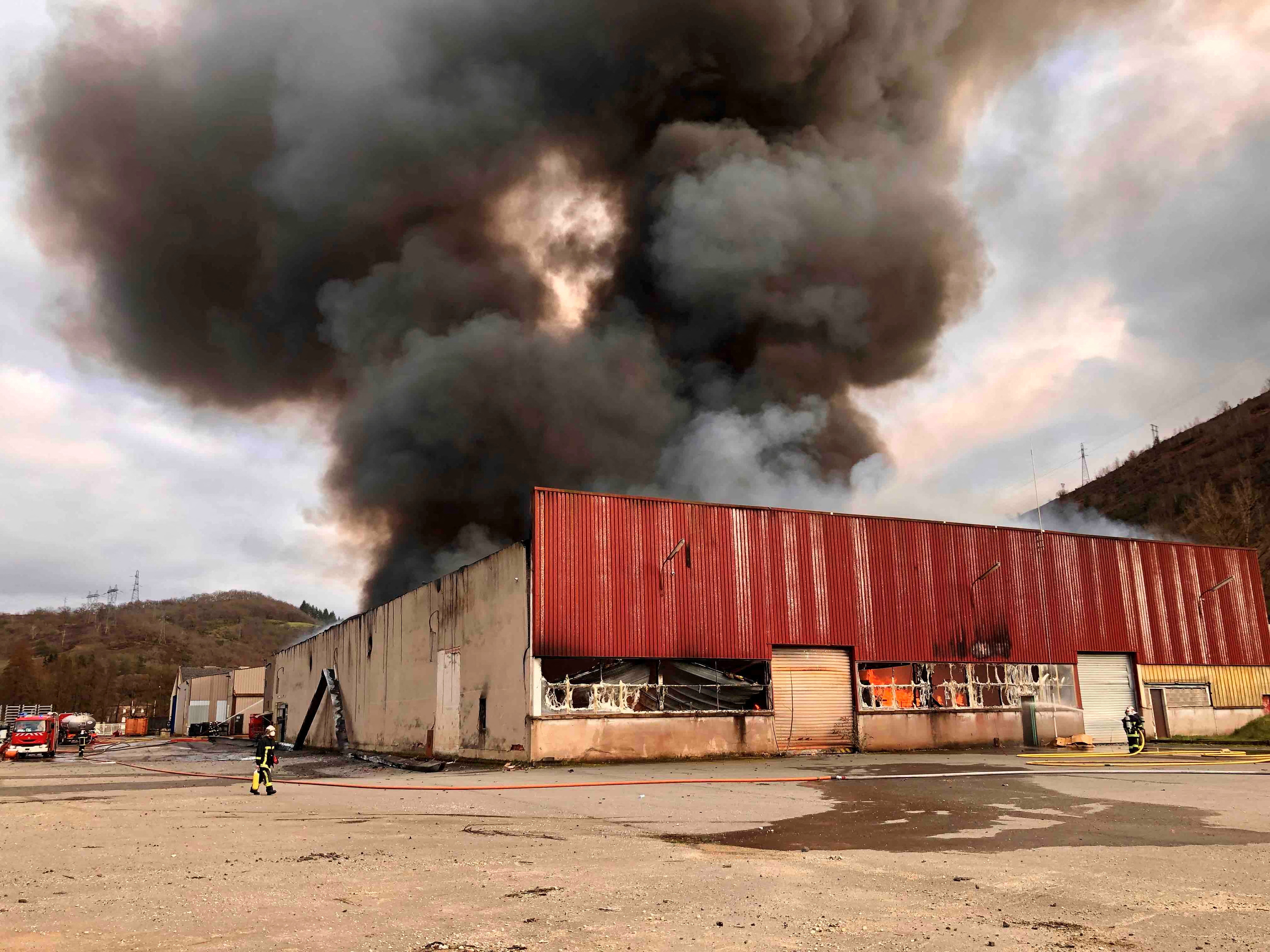The small village of Viviez is still shaken by it. On the afternoon of Saturday February 17, violent explosions disturbed the peace and quiet of this town in Aveyron. Then a large plume of black smoke worried the thousand residents living around the factory of the New Metal Refining Company (Snam). In its warehouse, 900 tons of lithium batteries went up in smoke.
Stable at low temperatures, this technology can catch fire if the mercury gets too hot. “The ideal operating temperature is around 20 or 30 degrees Celsius,” explains Ivan Lucas, teacher-researcher at the Nantes Institute of Materials. Above 70°C, there may be a risk of thermal runaway.” Once this reaction has started, it only takes a few minutes for the battery to burn and explode.
In December 2023, two containers, filled with lithium-based batteries, caught fire in a factory in Puy-de-Dôme. Last November, Réunion firefighters fought a fire at Port Ouest during which 200 batteries burned. According to a study published in 2020, lithium batteries are responsible for a 25% increase in fires in British and American centers that manage the collection and sorting of used batteries and waste electrical and electronic equipment.
Faced with the proliferation of these news items, professionals are alerting the authorities. “There is absolutely no legislation on the storage of these batteries,” laments Jean-Claude Solanny, training manager for Denios, a company specializing in the storage of dangerous products. If the group offers cabinets or containers that can contain fires, their presence is not obligatory in storage warehouses. “There are European directives which detail that batteries should not be knocked together, overloaded or placed in the sun,” explains the professional. But ultimately, everyone does what they want.” He pleads for legislation on this storage. Especially since these fires can release substances harmful to humans or the environment.
This Saturday, February 17, the residents of Viviez were forced to confine themselves. In the evening, the prefecture lifted the order, considering that the measurements carried out by the Marseille firefighters on site and around the site, “with regard to the substances emitted in the smoke, made it possible to eliminate any risk for the populations”. A communication that made certain associations cough. In a press release released this Monday, February 13, the Robin des Bois association, which warns in particular of the problems of ecology and pollution, expressed its “stupefaction” at the decision of the prefecture pointing out the risks on populations and the environment. “What happened is very serious”, for its part denounced the local environmental defense association Adeba on its Facebook page, ensuring that it was not satisfied with “reassuring press releases from the prefecture, the company and the Locally elected".
Lithium batteries, which are used today in vehicles, bicycles or electric scooters, are partly composed of electrolytic liquid, a highly flammable compound which acts as an energy conductor between the different batteries. “This conductive salt contains lithium, fluorine, and phosphate,” lists Ivan Lucas. When consumed, this salt can release hydrofluoric acid which can be highly toxic.” This element can represent “acute risks” for health and even “a mortal danger” according to the website of the Ministry of Labor, Health and Solidarity. “If we do a quick calculation, in Viviez in Aveyron, it would be 10 tonnes of this element which would have flown into the atmosphere,” adds the researcher.
“Lithium batteries also contain nickel, manganese, cobalt and plastic, the co-combustion of which has released toxic dust and soot,” adds the Robin des Bois association in its press release and calls on the European Union and France to “officially inform users and local populations of all the risks linked to the use, recycling and production of lithium batteries.”

 B:SM will break its investment record this year with 62 million euros
B:SM will break its investment record this year with 62 million euros War in Ukraine: when kyiv attacks Russia with inflatable balloons loaded with explosives
War in Ukraine: when kyiv attacks Russia with inflatable balloons loaded with explosives United States: divided on the question of presidential immunity, the Supreme Court offers respite to Trump
United States: divided on the question of presidential immunity, the Supreme Court offers respite to Trump Maurizio Molinari: “the Scurati affair, a European injury”
Maurizio Molinari: “the Scurati affair, a European injury” Irritable bowel syndrome: the effectiveness of low-carbohydrate diets is confirmed
Irritable bowel syndrome: the effectiveness of low-carbohydrate diets is confirmed Beware of the three main sources of poisoning in children
Beware of the three main sources of poisoning in children First three cases of “native” cholera confirmed in Mayotte
First three cases of “native” cholera confirmed in Mayotte Meningitis: compulsory vaccination for babies will be extended in 2025
Meningitis: compulsory vaccination for babies will be extended in 2025 In the United States, a Boeing 767 loses its emergency slide shortly after takeoff
In the United States, a Boeing 767 loses its emergency slide shortly after takeoff The A13 motorway will not reopen on May 1
The A13 motorway will not reopen on May 1 More than 1,500 items for less than 1 euro: the Dutch discounter Action opens a third store in Paris
More than 1,500 items for less than 1 euro: the Dutch discounter Action opens a third store in Paris 100 million euros in loans, water storage, Ecophyto plan… New measures from the executive towards farmers
100 million euros in loans, water storage, Ecophyto plan… New measures from the executive towards farmers Books poisoned with arsenic present in French libraries
Books poisoned with arsenic present in French libraries New York justice returns 30 works of art looted from Cambodia and Indonesia
New York justice returns 30 works of art looted from Cambodia and Indonesia Les Galons de la BD dedicates War Photographers, a virtuoso album on the Spanish War
Les Galons de la BD dedicates War Photographers, a virtuoso album on the Spanish War Theater: Kevin, or the example of an academic failure
Theater: Kevin, or the example of an academic failure Skoda Kodiaq 2024: a 'beast' plug-in hybrid SUV
Skoda Kodiaq 2024: a 'beast' plug-in hybrid SUV Tesla launches a new Model Y with 600 km of autonomy at a "more accessible price"
Tesla launches a new Model Y with 600 km of autonomy at a "more accessible price" The 10 best-selling cars in March 2024 in Spain: sales fall due to Easter
The 10 best-selling cars in March 2024 in Spain: sales fall due to Easter A private jet company buys more than 100 flying cars
A private jet company buys more than 100 flying cars This is how housing prices have changed in Spain in the last decade
This is how housing prices have changed in Spain in the last decade The home mortgage firm drops 10% in January and interest soars to 3.46%
The home mortgage firm drops 10% in January and interest soars to 3.46% The jewel of the Rocío de Nagüeles urbanization: a dream villa in Marbella
The jewel of the Rocío de Nagüeles urbanization: a dream villa in Marbella Rental prices grow by 7.3% in February: where does it go up and where does it go down?
Rental prices grow by 7.3% in February: where does it go up and where does it go down? Even on a mission for NATO, the Charles-de-Gaulle remains under French control, Lecornu responds to Mélenchon
Even on a mission for NATO, the Charles-de-Gaulle remains under French control, Lecornu responds to Mélenchon “Deadly Europe”, “economic decline”, immigration… What to remember from Emmanuel Macron’s speech at the Sorbonne
“Deadly Europe”, “economic decline”, immigration… What to remember from Emmanuel Macron’s speech at the Sorbonne Sale of Biogaran: The Republicans write to Emmanuel Macron
Sale of Biogaran: The Republicans write to Emmanuel Macron Europeans: “All those who claim that we don’t need Europe are liars”, criticizes Bayrou
Europeans: “All those who claim that we don’t need Europe are liars”, criticizes Bayrou These French cities that will boycott the World Cup in Qatar
These French cities that will boycott the World Cup in Qatar PSG: “Immense pride in continuing the adventure in Paris”, relishes Zaire-Emery
PSG: “Immense pride in continuing the adventure in Paris”, relishes Zaire-Emery Breaking: everything you need to know about this sport
Breaking: everything you need to know about this sport NBA: Lakers gain respite, Boston responds to Miami
NBA: Lakers gain respite, Boston responds to Miami Top 14: “a very severe red card”, estimates Labit (French Stadium)
Top 14: “a very severe red card”, estimates Labit (French Stadium)

















